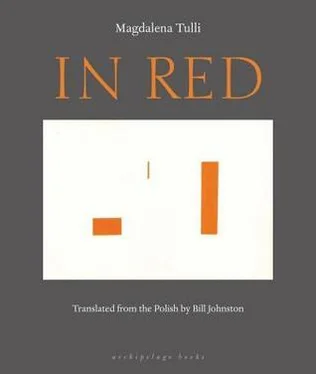Magdalena Tulli - In Red
Здесь есть возможность читать онлайн «Magdalena Tulli - In Red» весь текст электронной книги совершенно бесплатно (целиком полную версию без сокращений). В некоторых случаях можно слушать аудио, скачать через торрент в формате fb2 и присутствует краткое содержание. Год выпуска: 2011, Издательство: Archipelago Books, Жанр: Современная проза, на английском языке. Описание произведения, (предисловие) а так же отзывы посетителей доступны на портале библиотеки ЛибКат.
- Название:In Red
- Автор:
- Издательство:Archipelago Books
- Жанр:
- Год:2011
- ISBN:нет данных
- Рейтинг книги:3 / 5. Голосов: 1
-
Избранное:Добавить в избранное
- Отзывы:
-
Ваша оценка:
- 60
- 1
- 2
- 3
- 4
- 5
In Red: краткое содержание, описание и аннотация
Предлагаем к чтению аннотацию, описание, краткое содержание или предисловие (зависит от того, что написал сам автор книги «In Red»). Если вы не нашли необходимую информацию о книге — напишите в комментариях, мы постараемся отыскать её.
In this inventive novel, Magdalena Tulli creates a world that is unreal, yet strangely familiar and utterly convincing. Set in a mythical fourth partition of Poland,
is full of haunting descriptions of the town and its inhabitants; its power lies in Tulli's evocative, almost hallucinatory use of language.
In Red — читать онлайн бесплатно полную книгу (весь текст) целиком
Ниже представлен текст книги, разбитый по страницам. Система сохранения места последней прочитанной страницы, позволяет с удобством читать онлайн бесплатно книгу «In Red», без необходимости каждый раз заново искать на чём Вы остановились. Поставьте закладку, и сможете в любой момент перейти на страницу, на которой закончили чтение.
Интервал:
Закладка:
Magdalena Tulli
In Red
WHOEVER HAS BEEN EVERYWHERE AND SEEN everything, last of all should pay a visit to Stitchings. Simply take a seat in a sleigh and, before being overcome by sleep, speed across a plain that’s as empty as a blank sheet of paper, boundless as life itself. Sooner or later this someone — perhaps it is a traveling salesman with a valise full of samples — will see great mounds of snow stretching along streets to the four corners of the earth, toward empty, icy expanses. He’ll see pillars made of icicles, their snowy caps lost in the dark of a wintry sky. He’ll draw into his lungs air as sharp as a razor that cuts feeling away from breath. He’ll come to appreciate the benefits of a climate forever unencumbered by restless springtime breezes, by the indolence of summer swelter, or the misty sorrows of autumn. He’ll take a liking to frost, which conserves feelings and capital, protecting both from the corruption of decay.
Winter every day of the year and a darkness that softens contrasts and smoothes the sharpness of edges. In Stitchings the gloom would dissipate for a short moment around lunchtime. Before the soup a pink glow lit up the sky, during the main course the sun cast a handful of oblique rays over the rooftops, then after dessert the dusk would set in irrevocably. The stars in the local sky were strangers to movement and change, just like the gaslights that clung to their places among the constellations.
In the darkness the company of Loom & Son, Strobbel’s works, and Neumann’s factory went about their business, their affairs interwoven with those of the Swedish garrison. Upon a hard-frozen wilderness where only the winds howled from the four corners of the earth, the garrison, which was only of use for parades, endured in its daily routine. Its very existence should be regarded as an especially favorable sign, bearing in mind that a Swedish garrison is better than any Russian, Prussian, or Austrian one, just as a Swedish partition is better than any other possible partition.
The officers’ mess, the barracks, the stables, the manège, the magazine, and the parade ground covered in beaten, slippery snow, upon which, whenever necessary, leapfrog was played in full gear to the point of exhaustion — all these emerged from around successive curves as unexpectedly as sudden turns of fate. For Guards Street took its shape from the sinuous melody of the taps played every evening on the bugle. The instrument’s golden sounds soared into the air and wafted over the roofs of the apartment houses. But on the far side of the market square they dropped at once with the labored flight of a stunned bird. For there, in the slums, boys in caps with earflaps threw snowballs at anything that managed to rise above the down-to-earth. The factory hooter carried low, barely above the ground, wailing each morning on a single note that could express only the infinite darkness that flowed down the ravine of Factory Street at all hours of the day and the night. The whine of the hooter bounced off the bare brick wall of the barracks like peas off a tray. Guards Street and Factory Street fled from one another toward opposite ends of the earth.
Strobbel’s works was a porcelain factory. Its warehouses contained piles of hotel dishware: mute stacks of plates and bowls, large and small, countless silent gravy boats, and tureens, all bearing the emblem of a four-pointed snowflake on the bottom. In Neumann’s phonograph-record factory noble tenors, supercilious baritones, ominous or cheerful basses, and sopranos limpid as glass were pressed by unmelodiously clattering machines into black ebonite, where they remained invisible yet audible, forever cocooned in incomprehensible Italian words. As the factory workers fell asleep over their soup at home after work, disks spun before their eyes, white in the case of Strobbel’s men, black for Neumann’s.
The company of Loom & Son had its offices at the point where the axes of the main streets intersected. All the cash in Stitchings passed through its vault, while its depots handled all the goods manufactured in the town, which were packed into boxes and crates in which they then departed for the outside world from the railroad sidings at the far end of Factory Street. In addition, Loom owned majority shares in the famous local sewing shops. These produced ladies’ corsets that were snapped up by department stores abroad and were purchased just as eagerly by the local ladies, who thanks to the whalebone stays were able to sit straight even when waves of sleepy tedium were sweeping them toward the isles of afternoon naps. The gentlemen, resting their chins on the stiff collars of shirts sewn in those same shops, dozed in a quiet that could not be disturbed by the cannon of the Russo-Japanese War, even less by rifle fire from the German colonial forces in Africa.
The buildings of the railroad station extended along Coal Street. Sparks shot up from the smokestacks of unseen locomotives; prolonged whistles pierced the darkness. Porters with tin number plates on their caps waited for other people’s luggage. Railroad workers carried oil lamps along the storehouses, the jolting lights flashing across the undercarriages of cars and only by chance summoning out of the dark the coal heaps by the tracks with their perpetual sprinkling of snow, or the mounds of snow covered with coal dust — as like one another as day here is to night.
Salt Street was wreathed in a briny dust that made the eyes water. It ran through a suburb where miners lived, and led to the mines. On the way it left behind houses that poked out of snowdrifts here and there like abandoned wooden crates of the kind used to transport Stitchings salt. The houses sank in up to their windowsills, up to their roofs. In the nighttime the miners listened hopefully to cracking sounds somewhere beneath the floor. The deeper in the earth the better. For they knew only words that sound good far underground, words such as “Take cover!” or “Like the blazes!” Dazed by the bustle of the town, they would come to a halt in the middle of the sidewalk, lost, mute as beasts of burden, jostled on every side. A strident whistle would bring them back to alertness; they’d have to take shelter in a gateway to escape a hunting party out in search of fun, dressed in ill-fitting pants and oversized cloaks. They preferred to stay at home, in their houses that gravitated toward the antipodes.
But it was to them alone that the factories, stores, banking houses, and law firms owed their prosperity. Any kind of enterprise would have run aground in a heartbeat if there’d been a lack of salt, which, as everyone knows, is the essence of tears. For along with riches, success in industry and commerce brings weeping. A boom requires weeping if it is to last. Otherwise it will dry up. A certain number of tears are needed to fill the channels of trade and allow the expeditious flow of assets and liabilities, just as water under the keel is essential for ships with holds full of cargo.
The assets and liabilities of Loom & Son streamed back and forth around the world, acquiring now the form of Stitchings salt, now that of crude oil in large barrels, sacks of wheat, or heavy bolts of fabric. These goods had been traded by many generations of men whose mustaches had from their young days been covered with hoarfrost, their jaws set, their icy gaze free of illusions and capable of seeing right through faded varnish. The first of them had been a sailor in his youth. He had left behind a sailing ship under an English flag that cruised invisible waves inside a bottle, into which it had been blown by who knows what longings, having overcome the armada of the Spanish king and the narrow bottleneck of thick glass.
The Looms married late. Their wives each gave them an only child, a boy who was always given the name Sebastian.
Читать дальшеИнтервал:
Закладка:
Похожие книги на «In Red»
Представляем Вашему вниманию похожие книги на «In Red» списком для выбора. Мы отобрали схожую по названию и смыслу литературу в надежде предоставить читателям больше вариантов отыскать новые, интересные, ещё непрочитанные произведения.
Обсуждение, отзывы о книге «In Red» и просто собственные мнения читателей. Оставьте ваши комментарии, напишите, что Вы думаете о произведении, его смысле или главных героях. Укажите что конкретно понравилось, а что нет, и почему Вы так считаете.












